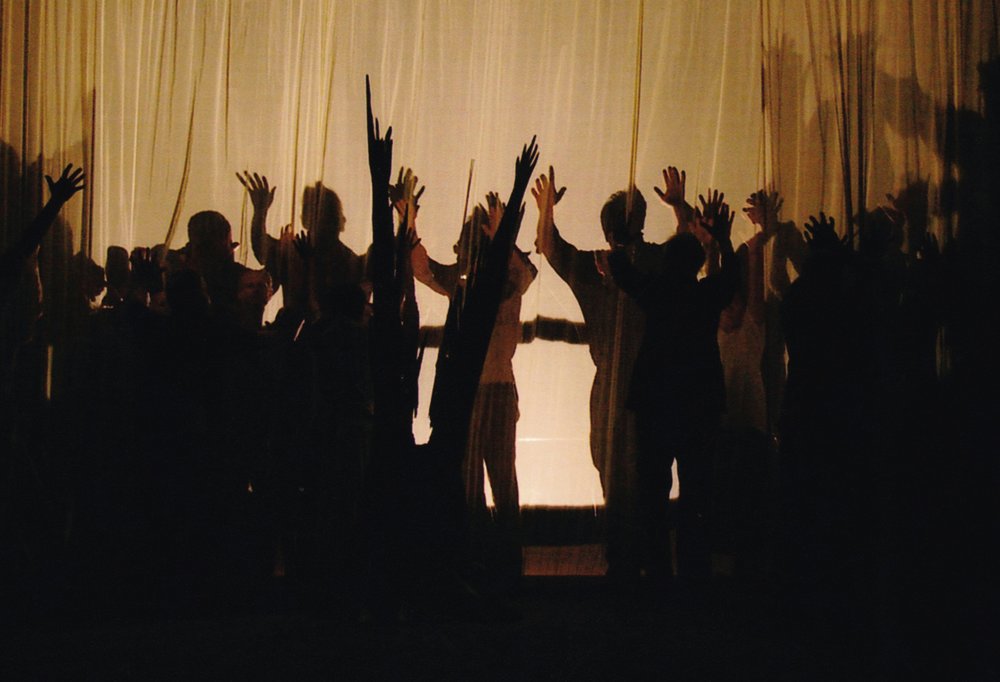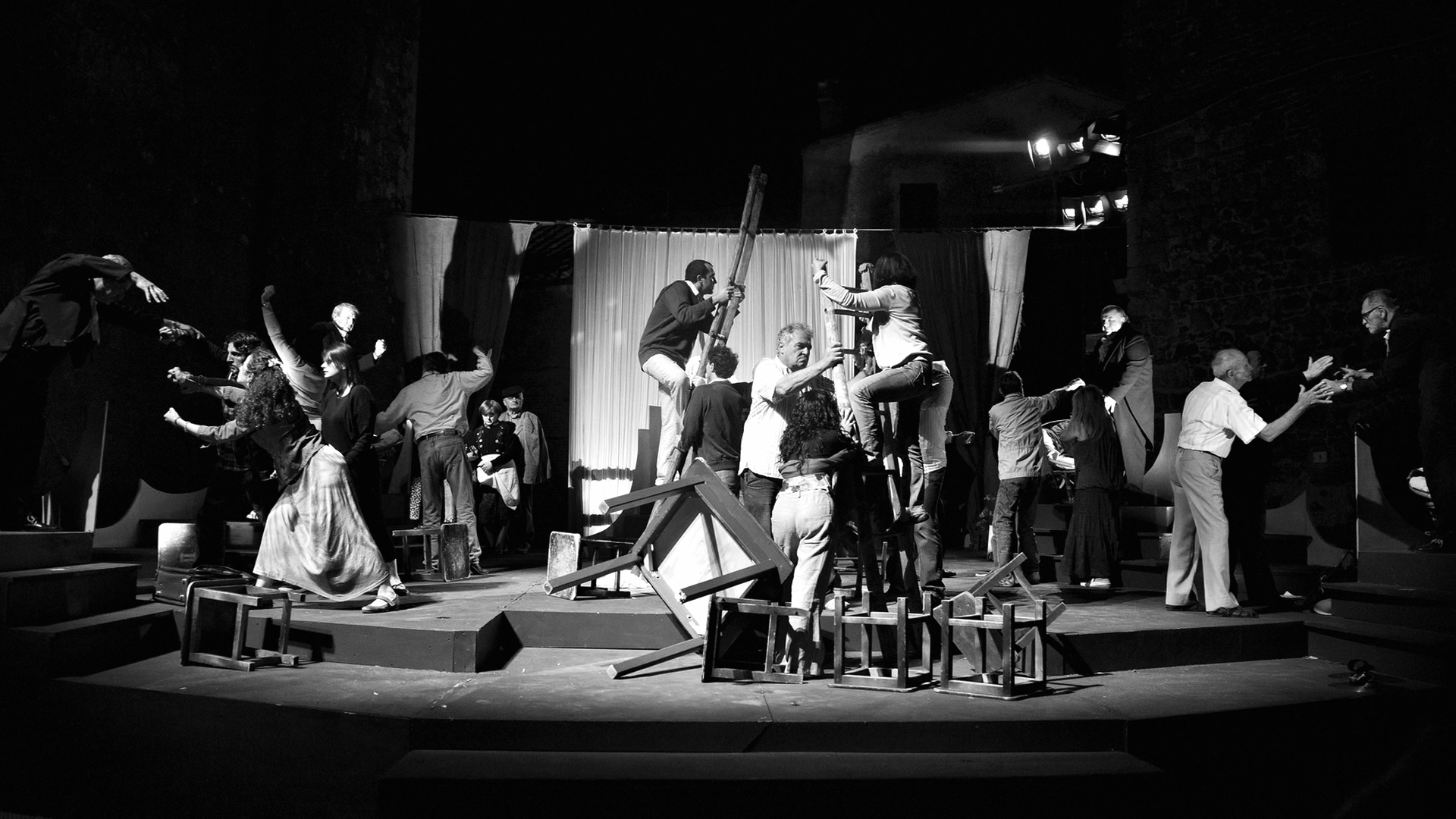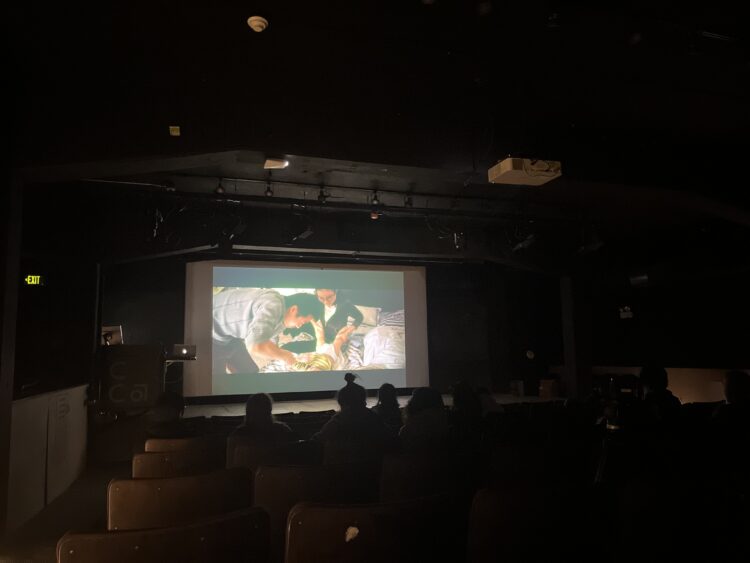Jeff Malmberg and Chris Shellen Document the Real Power of Art

What can art do in a time of turmoil? Documentary filmmakers Jeff Malmberg and Chris Shellen have made a career of showing how individuals and communities use art to work through personal, political and public issues. Their 2010 documentary Marwencol, which won numerous awards, documents how Mark Hogancamp uses photography and story-making to deal with a traumatic brain injury. A new film called Spettacolo–their Creative Capital project, premiering at SXSW in Austin, TX, on March 11–explores how villagers in a small Italian farming town preserve their heritage and confront community issues by turning their lives into an annual play.
We spoke to Chris and Jeff about shooting Spettacolo ahead of the premiere at SXSW.
Alex Teplitzky: Did you happen upon the theme of using art to deal with real life problems accidentally or was it intentional?
Jeff Malmberg: We ran into this story completely by accident. We were on a vacation in the middle of making Marwencol when we bumped into this strange little town with a theater. So it just sort of hit us in the face. That said, I think we’re both attracted to stories about people who use art to deal with their issues. It’s not like they are making art as a means of self-expresion–they’re making art to try to solve an actual problem.
For me, those stories always manage to get at the real “power of art” that people like to talk about in ways that other art stories just can’t. That “power of art” idea is usually so abstract–the power to do what exactly? In both these cases, the creation of art is granting these people the power to actually transform their lives and understand themselves.
Chris Shellen: We like to think of Marwencol and Spettacolo as kind of cousins of one another. They’re not directly related but they’re definitely in the same extended family. I think they’d make a good double-feature. We actually showed Marwencol to the villagers that are featured in Spettacolo to try to explain what it was that we did. They were having trouble understanding what we meant when would say we were making a “documentary film” so we translated Marwencol into Italian and played it for them in their little theater. They really got into it and saw some of the parallels between the two stories.
There are no solutions offered in the plays–just an appreciaton of different viewpoints. And the respect they have for each other is really something to see. They argue a lot but it’s that wonderful form of arguing where they always finish as friends. Fifty years of collaborating together has really taught them to see their differences as strengths.
Alex: So many people are looking to artists for answers about how to deal with all the social issues we are facing. Can you tell us about some of the issues the town addresses in their theater works?
Chris: The town in the film has staged a new play about themselves every summer for the last 50 years. So they’ve covered all kinds of topics–their trauma from World War II, the women’s movement, divorce, the loss of their identity as farmers, tourism threatening their heritage, housing developments that they haven’t liked, the post office closing. It depends on the year–it could be something big or something small. But the thing that seems to connect all the plays is the desire to have a true conversation about the subject and to appreciate each other’s point-of-view.
There are no solutions offered in the plays–just an appreciaton of different viewpoints. And the respect they have for each other is really something to see. They argue a lot but it’s that wonderful form of arguing where they always finish as friends. Fifty years of collaborating together has really taught them to see their differences as strengths. And certainly that’s something that we can all learn from, right?
Alex: I think so! Stepping back from that, what role does documentary have to play in this new political ring? A class is being offered at Union Docs, for instance, helping documentary filmmakers cope with traumatic situations that they might be forced into. We often look to documentary to take us into situations we wouldn’t go ourselves, and I feel like that’s really important right now.
Jeff: Well I think you’re right that we look to documentary to take us places we wouldn’t normally go ourselves. And I think that applies to the filmmakers too. As a filmmaker you want to try to go somewhere uncharted and then report back what you found–that’s what the film is to some degree. It’s the record of that journey.
But the great thing about documentary is that that uncharted place doesn’t have to be necessarily physical. It can be a psychological place too. It could be a warzone, but it could also be inside someone’s head or their heart and it can be very small. It’s amazing how willing the audience is to follow you absolutely anywhere and pay attention to the smallest details if you invite them to go somewhere with you.

Spettacolo by Jeff Malmberg and Chris Shellen
Alex: I love those kinds of documentaries that show mental strife, so I’m really excited to see Spettacolo myself. I’m also excited because half of my family speaks Italian, so we visited Italy a lot. I became familiar with the kind of small Italian township that you document in the film where everyone knows what’s going on and who’s who. That setting also resonated with people during the recent Elena Ferrante craze, learning about the neighborhood vibe in Naples. It has a small town America feel to it, but so not that, as well.
What was it like shooting the documentary? I’m wondering, for instance, what your relationship with the townspeople was like, or, if your shooting it affected their work at all?
Chris: That was kind of our first decision—to make sure we moved to the center of the town and just planted ourselves in the middle of it. It was the kind of place where you would go down in the morning to get a coffee—a walk that should take two minutes–and it would take an hour because everyone would want to stop and talk. Someone would say, “Oh, what was that bird chirping last night? Did your hear it?” and everyone would chime in with their guesses.
Coming from Los Angeles this was a new experience for us, obviously. You can’t help but be completely charmed by it and it makes you question what your personal definition of “community” is when you’re in a place like that. Of course, there are negatives that surely come along with it, but we found ourselves envying that type of life for sure. They’re just so close to each other and they care about each other so much.
Unfortunately, I think that aspect of their lives is going away pretty rapidly as modern life creeps in, so we wanted to make sure we captured it for the film. That became a big part of the film actually—the things we’re all leaving behind as we move forward.
Jeff: As for our shooting affecting their work, I think it definitely did a bit. But you hope that it does so in a positive way. We’re always trying to find a way to make the film a collaboration with our subjects because the whole objectivity, filmmaker vs. subject thing is so off the mark. You might as well just push it in the other direction. We tried to shape our production a little bit like their plays where they all had input into the creation of the film. They were the first ones we showed the film to in order to get their notes. I remember working on the film back in Los Angeles and thinking, “If we show it to them and all fifty people say they love it, we’re in trouble.” What we wanted was three or four of them a little upset and passionately explaining to us their ideas about it. And that’s basically what happened so I think we must have done something right.
Spettacolo premieres in Austin, TX, at SXSW March 11, 13 & 17. To find out where upcoming screenings are being held, check out the film’s website here.
